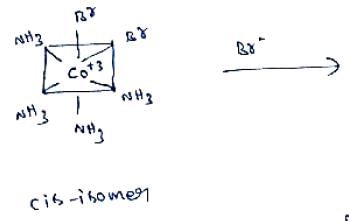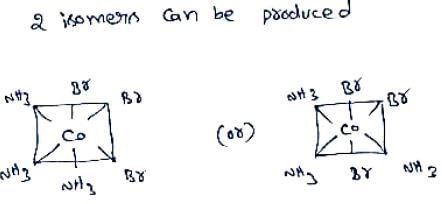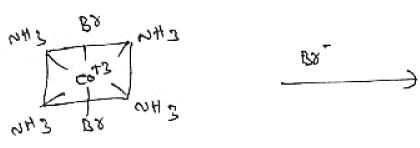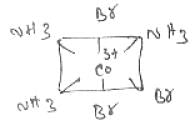JEE Exam > JEE Questions > Consider the following reaction and statement...
Start Learning for Free
Consider the following reaction and statements:
[Co(NH3)4Br2]+ +Br- → [Co(NH3)3Br3] + NH3
(I) Two isomers are produced if the reactant complex ion is a cis-isomer.
(II) Two isomers are produced if the reactant complex ion is a trans-isomer.
(III) Only one isomer is produced if the reactant complex ion is a trans-isomer.
(IV) Only one isomer is produced if the reactant complex ion is a cis-isomer.
The correct statements are :
[Co(NH3)4Br2]+ +Br- → [Co(NH3)3Br3] + NH3
(I) Two isomers are produced if the reactant complex ion is a cis-isomer.
(II) Two isomers are produced if the reactant complex ion is a trans-isomer.
(III) Only one isomer is produced if the reactant complex ion is a trans-isomer.
(IV) Only one isomer is produced if the reactant complex ion is a cis-isomer.
The correct statements are :
- a)(I) and (II)
- b)(I) and (III)
- c)(III) and (IV)
- d)(II) and (IV)
Correct answer is option 'B'. Can you explain this answer?
| FREE This question is part of | Download PDF Attempt this Test |
Verified Answer
Consider the following reaction and statements:[Co(NH3)4Br2]+ +Br-&rar...



As all the NH3 posit ions are identical only one product can be formed.

Most Upvoted Answer
Consider the following reaction and statements:[Co(NH3)4Br2]+ +Br-&rar...
The reaction can be written as:
[Co(NH3)4Br2] + 2Br- → [Co(NH3)4Br2]Br2-
Statements about the reaction:
1. The reactant [Co(NH3)4Br2] is a complex ion containing a central cobalt ion coordinated to four ammonia ligands and two bromide ions.
2. The product [Co(NH3)4Br2]Br2- is a complex ion containing a central cobalt ion coordinated to four ammonia ligands and four bromide ions.
3. The reaction involves the displacement of two bromide ions in the reactant [Co(NH3)4Br2] by two additional bromide ions.
4. The overall charge of the reactant and product complexes remains the same, as the bromide ions have the same charge.
5. The reaction is a substitution reaction, where the bromide ions are being replaced by other bromide ions.
6. The reaction is reversible, meaning that it can proceed in both the forward and reverse directions.
7. The equilibrium constant for the reaction would depend on factors such as temperature and concentration of reactants and products.
8. The reaction may occur in a solvent that can stabilize the complex ions, such as water or an organic solvent.
9. The reaction may be catalyzed by a suitable catalyst, such as a transition metal complex or an acid or base.
10. The reaction may occur spontaneously if the products are more stable than the reactants, as determined by factors such as bond energies and solvation energies.
[Co(NH3)4Br2] + 2Br- → [Co(NH3)4Br2]Br2-
Statements about the reaction:
1. The reactant [Co(NH3)4Br2] is a complex ion containing a central cobalt ion coordinated to four ammonia ligands and two bromide ions.
2. The product [Co(NH3)4Br2]Br2- is a complex ion containing a central cobalt ion coordinated to four ammonia ligands and four bromide ions.
3. The reaction involves the displacement of two bromide ions in the reactant [Co(NH3)4Br2] by two additional bromide ions.
4. The overall charge of the reactant and product complexes remains the same, as the bromide ions have the same charge.
5. The reaction is a substitution reaction, where the bromide ions are being replaced by other bromide ions.
6. The reaction is reversible, meaning that it can proceed in both the forward and reverse directions.
7. The equilibrium constant for the reaction would depend on factors such as temperature and concentration of reactants and products.
8. The reaction may occur in a solvent that can stabilize the complex ions, such as water or an organic solvent.
9. The reaction may be catalyzed by a suitable catalyst, such as a transition metal complex or an acid or base.
10. The reaction may occur spontaneously if the products are more stable than the reactants, as determined by factors such as bond energies and solvation energies.
Attention JEE Students!
To make sure you are not studying endlessly, EduRev has designed JEE study material, with Structured Courses, Videos, & Test Series. Plus get personalized analysis, doubt solving and improvement plans to achieve a great score in JEE.

|
Explore Courses for JEE exam
|

|
Similar JEE Doubts
Consider the following reaction and statements:[Co(NH3)4Br2]+ +Br-→[Co(NH3)3Br3] + NH3(I) Two isomers are produced if the reactant complex ion is a cis-isomer.(II) Two isomers are produced if the reactant complex ion is a trans-isomer.(III) Only one isomer is produced if the reactant complex ion is a trans-isomer.(IV) Only one isomer is produced if the reactant complex ion is a cis-isomer.The correct statements are :a)(I) and (II)b)(I) and (III)c)(III) and (IV)d)(II) and (IV)Correct answer is option 'B'. Can you explain this answer?
Question Description
Consider the following reaction and statements:[Co(NH3)4Br2]+ +Br-→[Co(NH3)3Br3] + NH3(I) Two isomers are produced if the reactant complex ion is a cis-isomer.(II) Two isomers are produced if the reactant complex ion is a trans-isomer.(III) Only one isomer is produced if the reactant complex ion is a trans-isomer.(IV) Only one isomer is produced if the reactant complex ion is a cis-isomer.The correct statements are :a)(I) and (II)b)(I) and (III)c)(III) and (IV)d)(II) and (IV)Correct answer is option 'B'. Can you explain this answer? for JEE 2024 is part of JEE preparation. The Question and answers have been prepared according to the JEE exam syllabus. Information about Consider the following reaction and statements:[Co(NH3)4Br2]+ +Br-→[Co(NH3)3Br3] + NH3(I) Two isomers are produced if the reactant complex ion is a cis-isomer.(II) Two isomers are produced if the reactant complex ion is a trans-isomer.(III) Only one isomer is produced if the reactant complex ion is a trans-isomer.(IV) Only one isomer is produced if the reactant complex ion is a cis-isomer.The correct statements are :a)(I) and (II)b)(I) and (III)c)(III) and (IV)d)(II) and (IV)Correct answer is option 'B'. Can you explain this answer? covers all topics & solutions for JEE 2024 Exam. Find important definitions, questions, meanings, examples, exercises and tests below for Consider the following reaction and statements:[Co(NH3)4Br2]+ +Br-→[Co(NH3)3Br3] + NH3(I) Two isomers are produced if the reactant complex ion is a cis-isomer.(II) Two isomers are produced if the reactant complex ion is a trans-isomer.(III) Only one isomer is produced if the reactant complex ion is a trans-isomer.(IV) Only one isomer is produced if the reactant complex ion is a cis-isomer.The correct statements are :a)(I) and (II)b)(I) and (III)c)(III) and (IV)d)(II) and (IV)Correct answer is option 'B'. Can you explain this answer?.
Consider the following reaction and statements:[Co(NH3)4Br2]+ +Br-→[Co(NH3)3Br3] + NH3(I) Two isomers are produced if the reactant complex ion is a cis-isomer.(II) Two isomers are produced if the reactant complex ion is a trans-isomer.(III) Only one isomer is produced if the reactant complex ion is a trans-isomer.(IV) Only one isomer is produced if the reactant complex ion is a cis-isomer.The correct statements are :a)(I) and (II)b)(I) and (III)c)(III) and (IV)d)(II) and (IV)Correct answer is option 'B'. Can you explain this answer? for JEE 2024 is part of JEE preparation. The Question and answers have been prepared according to the JEE exam syllabus. Information about Consider the following reaction and statements:[Co(NH3)4Br2]+ +Br-→[Co(NH3)3Br3] + NH3(I) Two isomers are produced if the reactant complex ion is a cis-isomer.(II) Two isomers are produced if the reactant complex ion is a trans-isomer.(III) Only one isomer is produced if the reactant complex ion is a trans-isomer.(IV) Only one isomer is produced if the reactant complex ion is a cis-isomer.The correct statements are :a)(I) and (II)b)(I) and (III)c)(III) and (IV)d)(II) and (IV)Correct answer is option 'B'. Can you explain this answer? covers all topics & solutions for JEE 2024 Exam. Find important definitions, questions, meanings, examples, exercises and tests below for Consider the following reaction and statements:[Co(NH3)4Br2]+ +Br-→[Co(NH3)3Br3] + NH3(I) Two isomers are produced if the reactant complex ion is a cis-isomer.(II) Two isomers are produced if the reactant complex ion is a trans-isomer.(III) Only one isomer is produced if the reactant complex ion is a trans-isomer.(IV) Only one isomer is produced if the reactant complex ion is a cis-isomer.The correct statements are :a)(I) and (II)b)(I) and (III)c)(III) and (IV)d)(II) and (IV)Correct answer is option 'B'. Can you explain this answer?.
Solutions for Consider the following reaction and statements:[Co(NH3)4Br2]+ +Br-→[Co(NH3)3Br3] + NH3(I) Two isomers are produced if the reactant complex ion is a cis-isomer.(II) Two isomers are produced if the reactant complex ion is a trans-isomer.(III) Only one isomer is produced if the reactant complex ion is a trans-isomer.(IV) Only one isomer is produced if the reactant complex ion is a cis-isomer.The correct statements are :a)(I) and (II)b)(I) and (III)c)(III) and (IV)d)(II) and (IV)Correct answer is option 'B'. Can you explain this answer? in English & in Hindi are available as part of our courses for JEE.
Download more important topics, notes, lectures and mock test series for JEE Exam by signing up for free.
Here you can find the meaning of Consider the following reaction and statements:[Co(NH3)4Br2]+ +Br-→[Co(NH3)3Br3] + NH3(I) Two isomers are produced if the reactant complex ion is a cis-isomer.(II) Two isomers are produced if the reactant complex ion is a trans-isomer.(III) Only one isomer is produced if the reactant complex ion is a trans-isomer.(IV) Only one isomer is produced if the reactant complex ion is a cis-isomer.The correct statements are :a)(I) and (II)b)(I) and (III)c)(III) and (IV)d)(II) and (IV)Correct answer is option 'B'. Can you explain this answer? defined & explained in the simplest way possible. Besides giving the explanation of
Consider the following reaction and statements:[Co(NH3)4Br2]+ +Br-→[Co(NH3)3Br3] + NH3(I) Two isomers are produced if the reactant complex ion is a cis-isomer.(II) Two isomers are produced if the reactant complex ion is a trans-isomer.(III) Only one isomer is produced if the reactant complex ion is a trans-isomer.(IV) Only one isomer is produced if the reactant complex ion is a cis-isomer.The correct statements are :a)(I) and (II)b)(I) and (III)c)(III) and (IV)d)(II) and (IV)Correct answer is option 'B'. Can you explain this answer?, a detailed solution for Consider the following reaction and statements:[Co(NH3)4Br2]+ +Br-→[Co(NH3)3Br3] + NH3(I) Two isomers are produced if the reactant complex ion is a cis-isomer.(II) Two isomers are produced if the reactant complex ion is a trans-isomer.(III) Only one isomer is produced if the reactant complex ion is a trans-isomer.(IV) Only one isomer is produced if the reactant complex ion is a cis-isomer.The correct statements are :a)(I) and (II)b)(I) and (III)c)(III) and (IV)d)(II) and (IV)Correct answer is option 'B'. Can you explain this answer? has been provided alongside types of Consider the following reaction and statements:[Co(NH3)4Br2]+ +Br-→[Co(NH3)3Br3] + NH3(I) Two isomers are produced if the reactant complex ion is a cis-isomer.(II) Two isomers are produced if the reactant complex ion is a trans-isomer.(III) Only one isomer is produced if the reactant complex ion is a trans-isomer.(IV) Only one isomer is produced if the reactant complex ion is a cis-isomer.The correct statements are :a)(I) and (II)b)(I) and (III)c)(III) and (IV)d)(II) and (IV)Correct answer is option 'B'. Can you explain this answer? theory, EduRev gives you an
ample number of questions to practice Consider the following reaction and statements:[Co(NH3)4Br2]+ +Br-→[Co(NH3)3Br3] + NH3(I) Two isomers are produced if the reactant complex ion is a cis-isomer.(II) Two isomers are produced if the reactant complex ion is a trans-isomer.(III) Only one isomer is produced if the reactant complex ion is a trans-isomer.(IV) Only one isomer is produced if the reactant complex ion is a cis-isomer.The correct statements are :a)(I) and (II)b)(I) and (III)c)(III) and (IV)d)(II) and (IV)Correct answer is option 'B'. Can you explain this answer? tests, examples and also practice JEE tests.

|
Explore Courses for JEE exam
|

|
Suggested Free Tests
Signup for Free!
Signup to see your scores go up within 7 days! Learn & Practice with 1000+ FREE Notes, Videos & Tests.
























